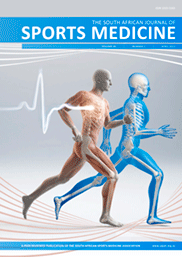Micro-oscillations in positive and negative affect during competitive laboratory cycle time trials – a preliminary study
DOI:
https://doi.org/10.7196/SAJSM.496Keywords:
affect, goal expectancy, during performance, cyclingAbstract
Background. By incorporating pre-performance or retrospective recall measurement methods, research has shown positive (PA) and negative affect (NA) to operate as both a precursor to, and as a consequence of performance in line with goal achievement. The extent of this affective change within sport is unclear, as measurement of affect within acute settings has yet to be adopted fully.
Objective. To conduct exploratory research examining affect and goal achievement during self-paced cycling to understand further their role during performance.
Methods. The positive and negative affect schedule (PANAS), Worcester affect scale (WAS) and ratings of goal achievement were completed by seven trained cyclists prior to two separate 20 km laboratory time trials. The WAS and ratings of goal achievement were also rated during each trial.
Results. Micro-oscillations in affect occurred throughout time trials and to a greater degree where participants were unsuccessful in reaching their goals. Successful trials were characterised by higher PA (p=0.000) and lower NA (p=0.000), with higher goal expectations from the start (p=0.008).
Conclusion. In unsuccessful trials, an overly aggressive start, perhaps due to inaccurate goal setting, led to an inability to maintain performance, with reductions in power output. Further clarification of the catalyst to the performance demise requires a parallel analysis of psychological and physiological parameters. In so doing, a greater understanding of the combined role of affect and goal expectation in pacing and performance will ensue; a benefit to both cyclist and coach alike.
Downloads
Downloads
Additional Files
- Fig 1. Worcester Affect Scale (WAS) median scores and power output during the time trial. Participants who were unsuccessful in trial two (i – iii), participants who were successful in trial two (iv – vi); PA – positive affect; NA – negative affecUntitled
- Fig 2. Ratings of goal expectancy (median scores) between the successful and unsuccessful participants in trial two only.
Published
Issue
Section
License
Copyright (c) 2014 South African Journal of Sports Medicine

This work is licensed under a Creative Commons Attribution 4.0 International License.
The South African Journal of Sports Medicine reserves copyright of the material published. The work is licensed under a Creative Commons Attribution 4.0 (CC BY 4.0) International License. Material submitted for publication in the South African Journal of Sports Medicine is accepted provided it has not been published elsewhere. The South African Journal of Sports Medicine does not hold itself responsible for statements made by the authors.
How to Cite
- Abstract 538
- PDF 509
- Fig 1. Worcester Affect Scale (WAS) median scores and power output during the time trial. Participants who were unsuccessful in trial two (i – iii), participants who were successful in trial two (iv – vi); PA – positive affect; NA – negative affecUntitled 55
- Fig 2. Ratings of goal expectancy (median scores) between the successful and unsuccessful participants in trial two only. 65





.png)